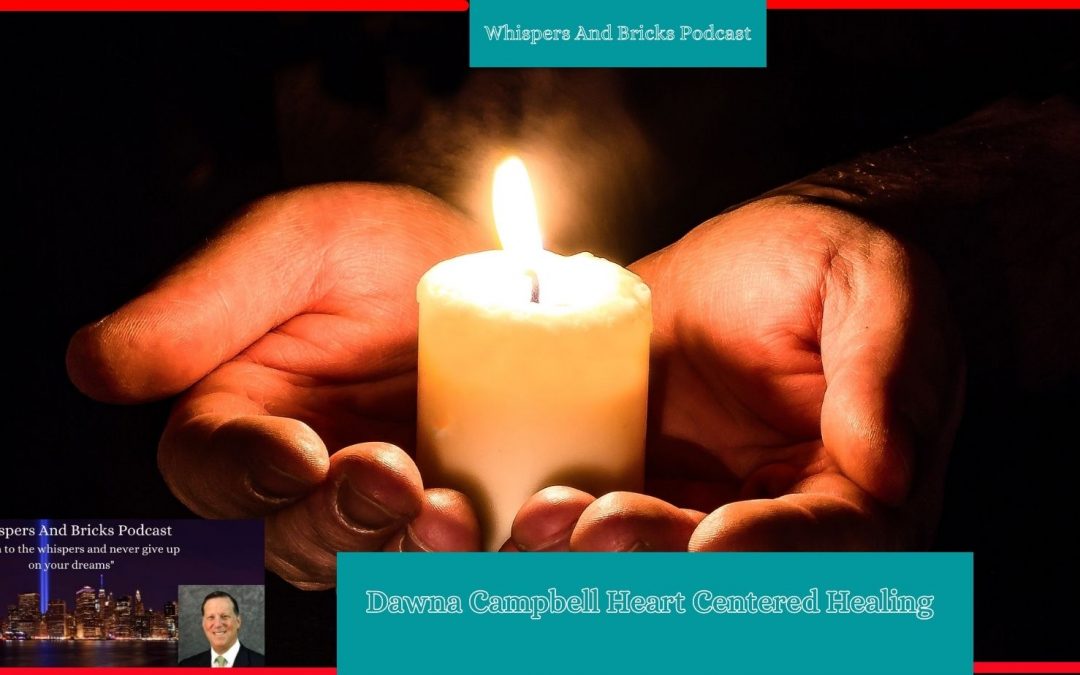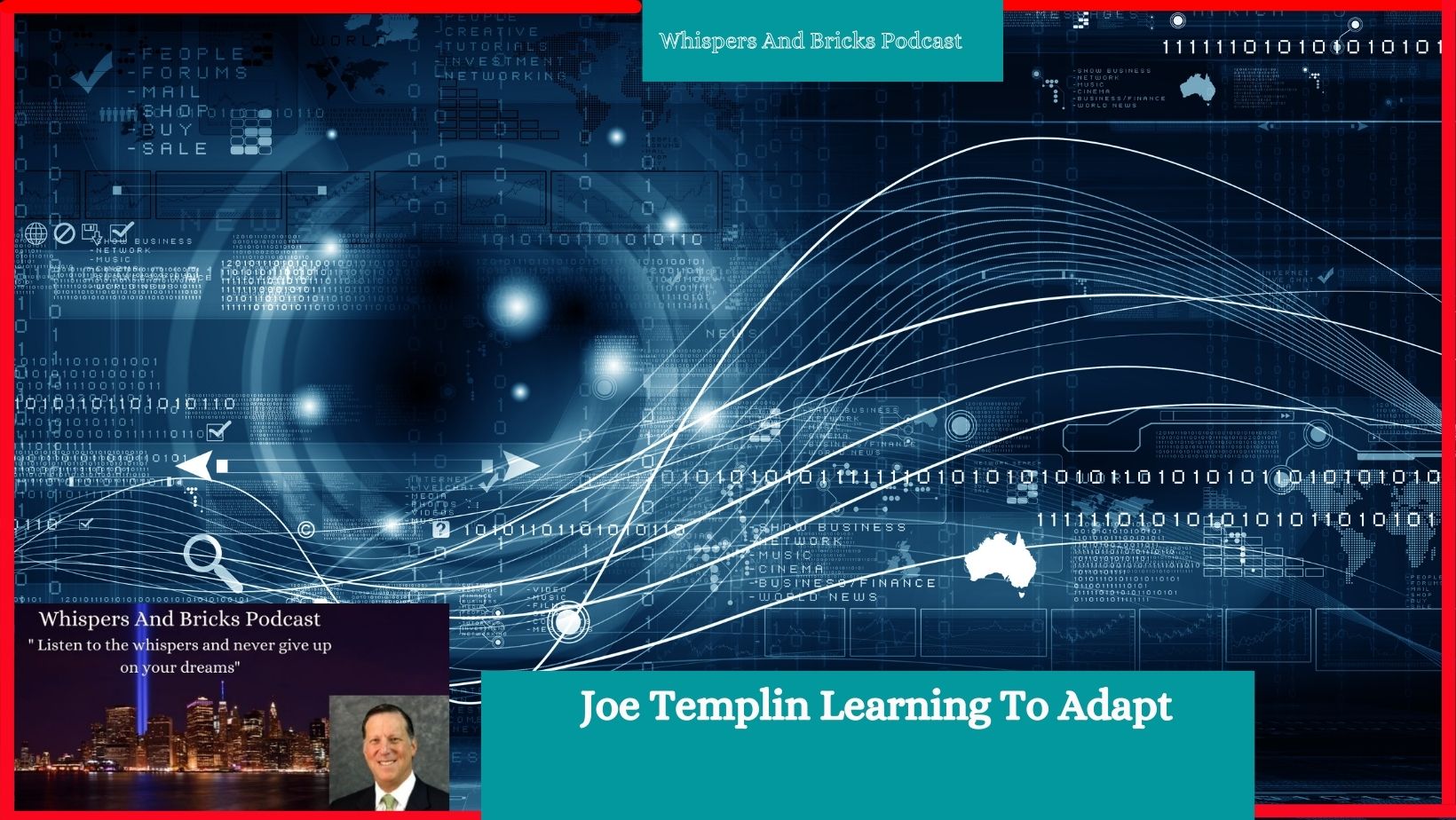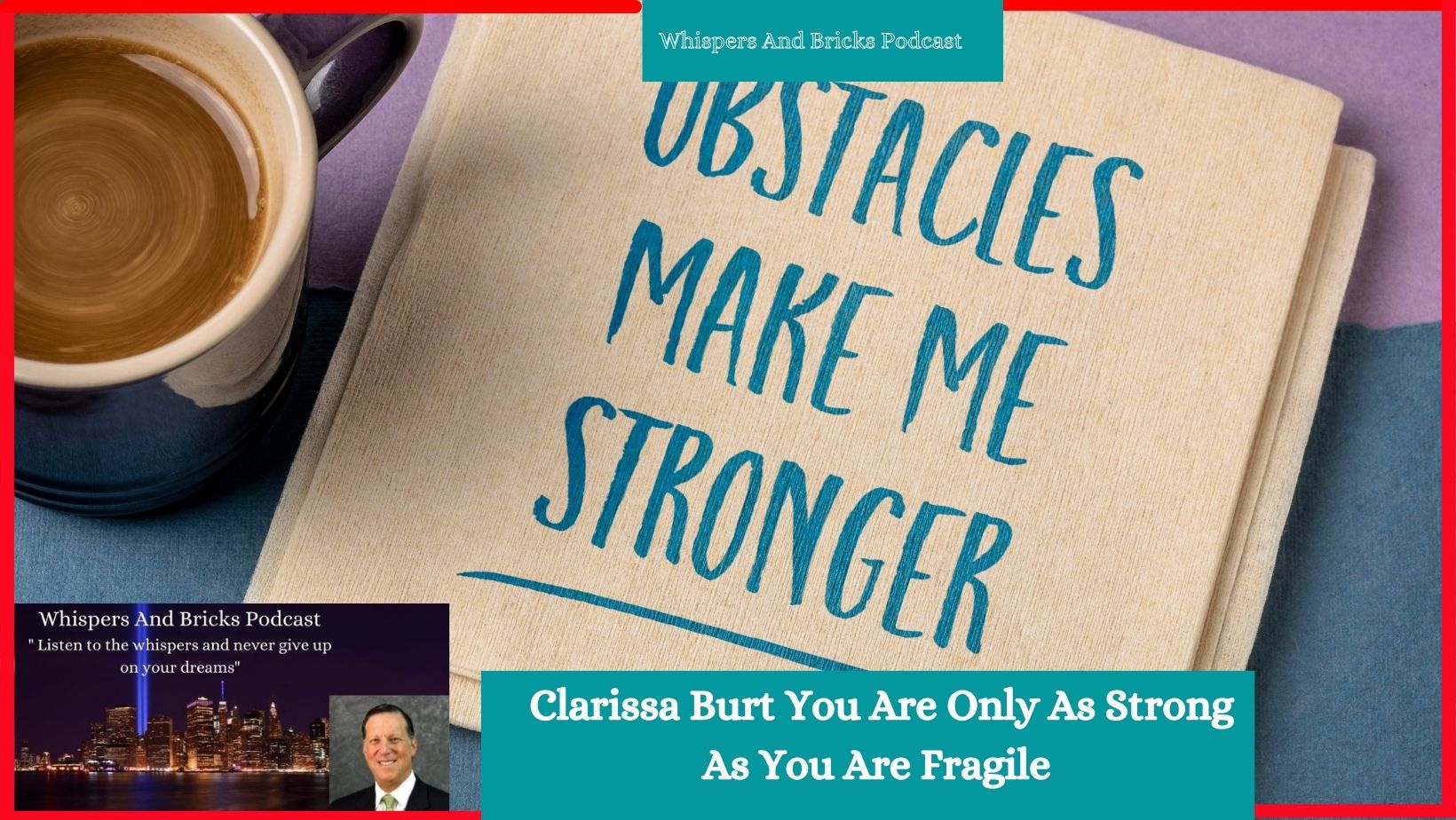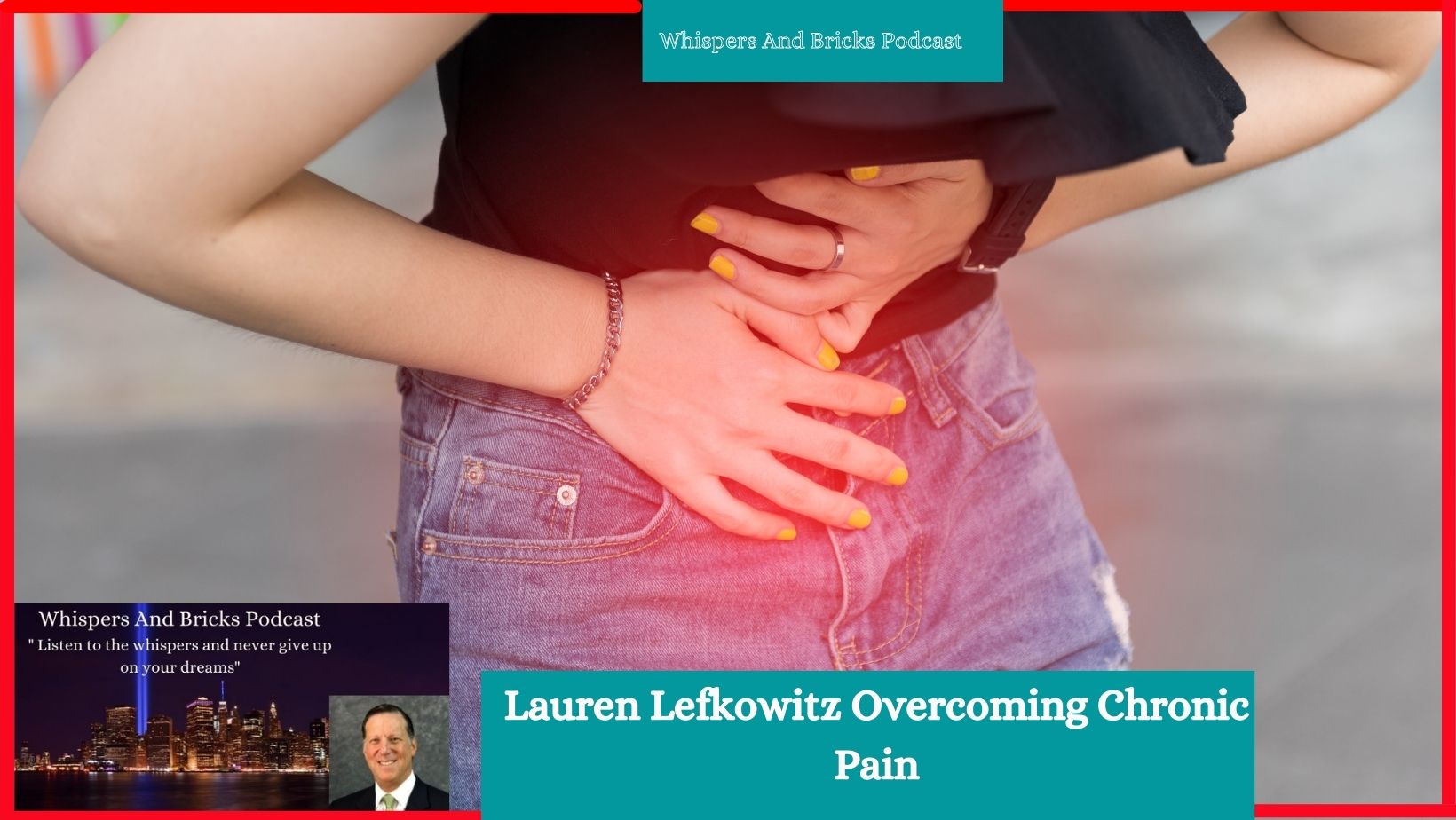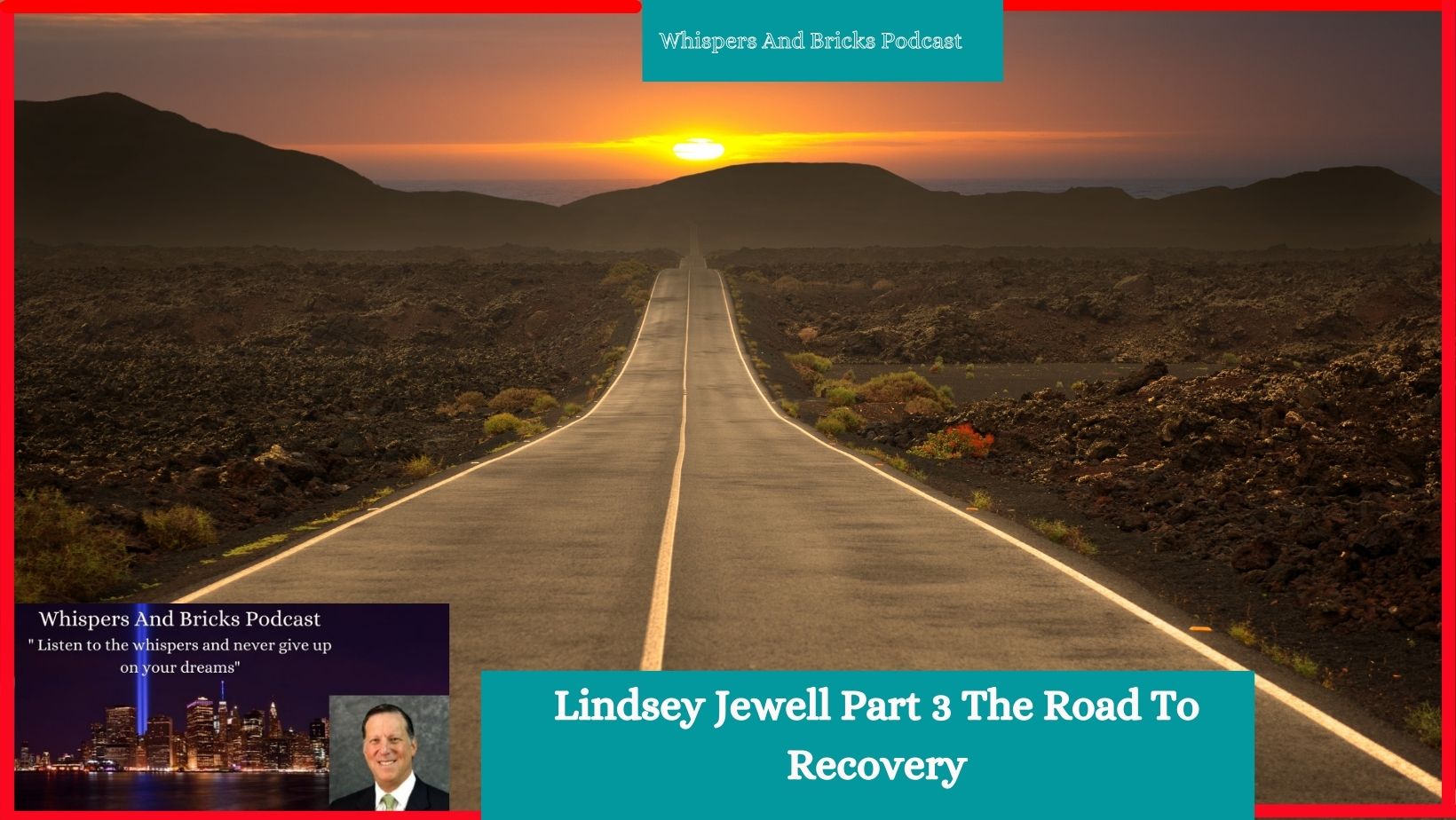Joe Templin Learning To Adapt
Summary:
Joe Templin has had a very successful and varied career but one of the bricks he learned the most from was having a child with special needs. His son has Autism and both his sons have ADHD. Helping his sons navigate the world has taught him lessons that not only help his children deal with change but help his business clients deal with the unknown. He reminds us to not only embrace change but plan ahead for it. His story reminds us that no matter the bricks we face we can find ways to adapt and thrive.
Show notes:
https://everyday-excellence.com/meetjoe/
Episode Transcription
Intro Plays
Ari: Welcome to whispers and bricks. My name is Ari Schonbrun and I’m your hosts. My guest today is Joe Templin. He calls himself a reformed physicist, financial planner, startup founder and autodidactic polymath that best describes is best described as a Swiss army knife. Say that three times fast. Joe Tillman has invested the past two and a half plus decades to helping others reach their financial potential as a planner, trainer, mentor and creator. Joe has served as a member of naifa The National Association of insurance and financial advisors on the local, state and national level, and including three terms on the naifa National Young advisors team subcommittee, and was honored as one of the 2011 for under 40 is a graduate of the leadership and Life Institute of naifa as well as Rensselaer Polytechnic Institute, and is an alum of Johns Hopkins University. George is CFP and has written hundreds of review questions for the exam. He has been a business columnist for the Albany Times unions, advisor today magazine, and insurance news net Joe earned is a certified executive counselor designation as well as his certified master executive caseloads. 2021. Joe is currently a vice president of the Autism Society of the greater capital region. He is also the managing director of the unique minds Consulting Group, and is the author of everyday excellence, the Kindle number one new release in professional development. Joe is the co founder and president of the intro machine Inc, an organization dedicated to teaching professionals in a variety of fields, how to build an introduction based business. He has spoken all across the US and Canada on ethical business development in his free time. I don’t know where he gets that from. Joe enjoys running ultra marathons, Crazy guy. And as a fourth Dawn from the Koch kick won in Seoul Korea. I don’t know what that is. And former international champion. He lives in gainsford New York with his hooligan boys, Danny, Liam and Colin. They’re huge Yankee fans. Please help me welcome Joe temple template.
Joe: You’re gonna read all that I just like make up something. Make it sound like I’ve done something.
Ari: Yeah, well, you know what? I wasn’t going to read all that. But I need to fill fill some airspace. You
Joe: know what I mean? Okay. Air to try and be slightly amusing.
Ari: Yeah, I wouldn’t worry about it. How are you? Okay, how are you, Joe? I’m doing well. How you doing my friend. I’m getting better. Always better, always gets better.
Joe: You know what, that’s American optimism right there. Love it. Here
Ari: you go. There you go. Okay. Now, as you know, the name of this podcast is whispers of bricks, whispers of those voices telling us what the right thing to do is and they represent the good in life. The bricks represent the bad things we go through in life. And let’s be real, everybody has bricks thrown at them at some point in time or another in their lifetime. Some more bricks, some less bricks, some bigger, some smaller. Now there’s always you
Joe: should take those bricks and build a castle out of them. Like, you know, defend it and get rid of the bad guys.
Ari: They go. I don’t know why I think of that. There were several reasons why ESRI my guests on the show. After our initial conversation. I knew there were people in my audience who go through some of the same things that you were going through. They had been here with brick after brick, much like what you had gone through. And they needed to hear it to know that they could get through the trials and tribulations, the same way that you did. They needed to know that there are whispers out there that could save them. Now in your life, you’ve had many bricks thrown at you. But let’s start with a little background info to start with. To start with. Your mom was in nun. Your dad was a military man. Your they had six kids. Six of us
Joe: that survived. Yeah. Tell us about that. So my mom was a farm kid. She was the youngest of seven growing up in upstate New York. And my dad went to RPI, which is part of the reason I ended up there. He started in 1958 because of Sputnik when they decided the US government decided to start putting a lot more investment into technology to beat the Russians. So my dad went on ROTC scholarship to RPI graduated, got commissioned. As a butter bar and the US Army infantry, and then three months later was the bad pigs incident. Oh, okay. Then we started to ramp up with this little thing called Vietnam. I remember that well, yeah. So that’s, you know, my dad, mom and dad met on a blind date arranged by my mom’s older sister who’s my godmother, to and her boyfriend, who was my dad’s fraternity Big Brother. They went on a blind date. They did a whole bunch of times that my mom decided, screw this. I’m going into the convent.
Ari: Oh, so. So she was she she was dating first. And then she became a nun. I thought she was a nun. And then
Joe: out of the convent started dating my dad again,
Ari: how long? How long was she in the continent?
Joe: I don’t know, this is before I was born. So obviously, now that most of my aunts and uncles have passed on, I can’t get the right story anywhere. Okay. But then, like, they got engaged, she gives the ring back because back into the convent, she was in the comment, like two or three times I think it was three is what system. And eventually, Sister Margaret’s like, you’re gonna marry John. And she ended up marrying my dad. And there’s six of us. And, you know, they lived happily ever after until my mom eventually developed cancer from smoking two packs a day probably from dealing with six kids, and passing on about eight years ago.
Ari: And how old was she when she passed on?
Joe: She was 73.
Ari: 73 All right. Well, I think let’s let’s go back to I think this was the first major break that you got hit with was the age of 10. When you were, as you said, quote, unquote, legally dead from asthma. Can you tell us
Joe: about this? Well, you know, there were lots of bricks leading up to that with the various asthma attacks. Because back in the early 1970s, I mean, they didn’t have the puffers that they have now, and all that. So if you were having an asthma attack, you’d need like a shot of adrenaline, or, you know, they would do one of those things where they were basically blowing adrenaline and steroids directly into your lungs, and then they’d stick in an oxygen tent for a week and all that. So I was having a real bad asthma attack. I was 10 years old, we go see Doc Murray, I’m laying there on the examination table, and all sudden, I no longer had a tight chest and I’m floating on up and there’s the big light and everything I’m looking down, Doc Marie becomes like an octopus with all these arms. And he’s like, going like this, and my mom’s freaking out. And I heard you know, the big deep voice. It’s not yet time then as back down my body and just, you know, having trouble breathing and off to the hospital. Wow.
Ari: Wow. So you saw the bright light?
Joe: Yeah, I saw the bright light. And that’s part of the reason why I’m like this today. No, not completely insane. That’s from other things. But because, you know, if you get a second chance like that, and this is one of the things that, you know, I’d love to hear from about your story a little bit on this. When you get that second chance at life. You don’t waste it. I mean, we get 86,400 seconds a day. Doesn’t matter. If you’re Bill Gates, or a kid in college, you get the same amount and you can’t like bank some for next week when you know you’re going to need them. So I as my friend say, burn the candle at both ends and in the middle. And so I accomplished more typically in one year than most people do in a decade. And that’s just the way it is because I’m nonstop.
Ari: Wow, wow. Well, I do know that you are an underachiever because you started college at the ripe old age of 13.
Joe: Right, because my parents said 12 was too young to start college. Ah,
Ari: okay, so you were an underachiever. 13 years old. You started college? What I mean, what was? How did that come about? Like, were you just bored in school? Did they? Did they
Joe: there was partially that? Yeah. And so like, my mom actually refused to tell me what my IQ scores ever were. But I found out that they were, you know, the first digit determine what I saw was a two. So I used to be wicked smart. But I told my mom was like eight years old that I want to learn everything that there was no and she’s like, Well, you better get started, you know. So, to this day, I have that attitude. And that’s part of the reason why I’m an autodidactic polymath is that I get fascinated by everything, whether it’s finance, physics, psychology, so I am a sponge when it comes to learning and a lot of things have come From that it made me a very good intelligence officer. It’s helped me as a writer makes me always, you know, everyone’s first choice at trivia night in the pub. So I’ve learned and just had this absolute desire to experience and learn things from even before I had the encounter, as we’ll call it. And so that’s carried forward in a lot of ways. So the Johns Hopkins University was introducing a special program in the 1980s, which we nicknamed genius camp. And I was one of the first people in upstate New York to be involved with it with my Irish twin, my older brother, Jay. And so at 13 years old, I was taking college classes.
Ari: So what was it like being Sheldon?
Joe: It’s funny saying that, because then later on, I went into applied physics. So everybody’s like, Oh, you know, the big bang theory that’s like you template on it. And I have never actually seen an entire episode of that. And well, even though the it’s funny, because it’s true. GIF is my favorite gift to use on other people.
Ari: Yeah. So what was just, you know, just to veer off a little bit, what was it? Like? I mean, you’re 13 years old, you’re going to college? I mean, with guys that are 1819 20. How is how did you I’d
Joe: always been exposed to people who are older because my mom was the youngest. And she had us when she was relatively older. So my cousins were all five 815 years older than me. So I grew up with them as my models, not always necessarily good models. But I mean, my mom said that when I was like two years old, and she was teaching my cousin and helping her with her high school biology homework, I was dancing around and singing about deoxy ribonucleic acid, and my cousin wanted to strangle me. And then later on that cousin was actually head of the science department at high school I went to, so that sort of laid the groundwork. Like I designed an atomic bomb was 11 years old, maybe I was 12. And I asked my mom, if she could give me any radioactive material because she was former radiation biologist. She wanted to know why I explained. So of course, she said, No. I mean, I wanted to get a chemistry set. She’s like, Okay, you need to take high school chemistry first. So I took high school chemistry, did really well. I’m like, where’s my chemistry said, she’s like, You need to take AP Chem. Before I do that. I’m like, Alright, so I took AP Chemistry, I got five on the exam. And like, where’s my chemistry set? She’s like, You’re too dangerous now. So of course, I ended up going into physics, and working for the government designing weapons. So this is what happens if you don’t give your kid a chemistry set. You’re going over atomic bombs and stuff like that. So according to the parents, it’s like that scene from NCIS. Where again, is, you know, back seeing his dad and his dad, when when take the rifle away was a kid. So he ended up becoming a navy sniper. It’s just like that give you the chemistry set. All right, we’ll get a copy of the NRCS cookbook, and then go and be an Intel officer. All right.
Ari: Let’s fast forward. Now you have three children, two of whom are actually special needs. Yes. Tell us, you know that that must have been very interesting, you know, trying to raise three kids, two of whom are special needs. You must have acquired some kind of, you know, skills that most parents would not have acquired. That’s what it was like, tell us what you did tell us, you know, how you how you how you dealt with it?
Joe: Well, before my mom died, and this is before my youngest, are either more diagnosed as autistic. I used to call her up and I’d be like, Mom, I’m so sorry. And she’s like, which one? And would they do this time? Because, you know, she used to say that she would curse me with what just like myself, and I got three of them. So there is that going on? So my youngest was diagnosed first. And he was diagnosed with autism and ADHD simultaneously. And he had horrible eyesight, so he could like barely see and he had sensory issues. So in kindergarten, first grade, it was like having a drunk toddler in Vegas with the overstimulation. And like, every time I turned around, I was getting a call from the school app to come pick him up. He ran from a bus, you know, he got thrown out for a day for throwing rocks at kid. He got thrown out three summer programs in a one week and a half week period, because of just having this uncontrolled bull. Not just energy, but in ability to relate to other individuals. And so we got him diagnosed and then that was actually a great thing. Because once we know what’s wrong, you’re not wrong, but why he’s different because he’s not Ron, he’s just difficult. He’s, he says he says he’s immune, he has super power. So I go, and he does have some, you know, incredible intellectual abilities. So, but then we were able to start dealing with, we were starting to, we’re able to get the school social worker, we’re starting to learn strategies, I reached out to autistic communities, I talked with one of my friends, who’s a highly successful physicist and executive, and he’s got us on it. And so he was, in many ways my mentor through there. So when I was having bad days, I could call him. And when he was having bad days, Jason would call me. And we will be able to support each other on this. So that’s one of the things in the special needs community, whether it’s a neurological special needs like mine, or I’ve got a friend whose son had a rare foreign pediatric cancer, or who’s got kids have diabetes, finding your tribe, your support group that you guys can swap stories, and ideas. And you know, shoulders is a major, major thing. So my Cub Scout pack, I’d say a quarter of my kids are special needs in some capacity. So some of the things that I’ve been, I’ve learned over time, I actually sit down with the parents, I’m like, Hey, you might want to try this. Here’s an idea that, you know, we’ve used as worked. And they’re like, Thank God for this because one, the kids, we accept all kids, it doesn’t matter how weird they are in Cub Scouts. And some of them are really weird that there’s no excuse. They’re just strange heads. But that’s awesome. There’s still, we still love them. But it gives the kids peers and kids who are a little bit older that they can model off of because this, like, with my kids, my youngest and my oldest are on the spectrum, my oldest can be highly disruptive, to say the least. And so my youngest models off of him. So having other kids a year or two ahead of him three years ahead of him, that he can see and have a different path that he can walk because of that is a very good thing. So any of your listeners who have children that are on the spectrum, or have these emotional support needs, I would recommend that they find organizations like that, or groups like that, where the kids can see better influences better behavior, if it’s whether it’s the older kids, or the leadership around it, so that they can have this image of this is the better way overall. So in terms of strategies, one of the strategies that I picked up from Jason that I’ve applied with my youngest son, and actually I apply in business all the time that I teach my clients is playing the white F game. Because with autistic kids, they very often have this checklist in their head of how things are gonna go they write their narrative, which is part of the reason why some of them don’t like to read fiction because the plot twists, we do throw a wrench in their works. And if something does not go the way that they have scripted in their head, that’s part of the time that they have big meltdowns and some of the issues. So what I did with my son is we learned to play the what if game. So we’re gonna go to your favorite restaurant on your birthday, buddy. What are we going to do? If they are close? What if they are closed? What’s the backup plan? And he helps develop that plan. So he’s buying in? So he has emotional invested interest in Okay, da, if the sunsets closed, we’re gonna go ahead and race. All right, good. Now what if we go to sunset? And you want to have nachos? You said your favorite food? Yes. Okay, what if they don’t have nachos? What are you going to do? I’m going to do this. And so it allows him to plan out what he can do in terms of alternative paths. If what he is foreseeing is not happening. And this reduces the stress and allows him to be comfortable. So if you’re going on like a plane trip, or if you’re planning a night out or planning something, taking a couple of minutes to sit there and play the what if game, on the most likely disruptions helps reduce that stress level and helps them cope. So with my clients, my business owners, I teach them to this Okay, what if this sale does not go through? What if the client says acts in response to your presentation, and it allows us to essentially roleplay alternatives beforehand so that these clients are better prepared, if something Then comes from left field. And the origin of this actually, in some ways goes all the way back to Sun Tzu’s The Art of War. The victorious general
conducts 1000s of calculations in his fortress era, he marches out to battle, if you played this game and figure out the alternatives and what could happen, and what your responses are, it allows you to think two or three steps ahead, sort of like a chess grandmaster. And this way, no matter what is occurring, in this situation, you are at least somewhat prepared for the outcome. And so you can control and get what you need.
Ari: It’s absolutely brilliant. I mean, it’s, I mean, ah, I gotta be honest with you, I mean, all that That’s brilliant. Something that I think everybody could, could learn from. Now, in, but when we had our time, just you and I, and we were talking, you mentioned something, you have another, you have another another way of dealing with situations, and that’s called the reset button. Yeah, tell us about the reset button.
Joe: So the reset button is actually something that we as big people can use, if our days spiraling out of control, we’ve all had that day where it’s the absolute horrible, no good day where it starts with you spilling coffee on yourself on the commute. Maybe you have a flat tire, though, the computer’s not working properly, you get the call for you know, disrupting things. And it’s just spiraling out of control. And we need to, if it’s like dominoes, going, you know, being knocked over, we need to put a hand there to stop the fall. We need to literally pause everything and be able to take a deep breath, and rewind and reset. So when my youngest is having a really bad morning, when he gets up, it happens sometimes he didn’t sleep well, maybe you know, his brothers were being jerks, which, if you have older brothers, you know that they are jerks, that’s part of their responsibility. So whatever it is, if he’s having a bad start to the day, before that can spiral out of control, and he takes it to school or whatever. I literally say, alright, buddy, we’re going to hit the reset button. And we go back to his room, he takes his glasses off, puts them on his nightstand, shoes off, crawls back into bed, I tuck him in real tight, because a lot of kids with sensory issues like almost being swaddled like babies, because it makes them comfortable. It helps them to calm down. So I swaddle him in real tight, tuck him in, turn the lights out, and I walk out. And I come back in. Two minutes later, three minutes later, I basically wake him up as if it’s a brand new day, we forgotten all the crap that happened in that 1015 minutes or half hour would that was up. And you know, being nasty, or whatever. So we just play it forward from that when I wake them up, you know, with sweet smile. Hey, man, come on, let’s get up. No, we’re running a little bit late today, but it’s gonna be a good day. And we just I just literally give them a chance to restart it with a fresh slate.
Ari: Wow, that’s brilliant. Absolutely brilliant. Let me ask you this. Was there ever a point in your life where you, you’d suck like solo. He said, You know what? I just I can’t do this anymore. It’s too hard. You know? I’m not giving up on my dreams. And if yes, how did you overcome?
Joe: Okay, I have to admit, I hit that point multiple times every single week, because my goals are so big. When you’re trying to change the world when you’re trying to, you know, break through records, be an Olympian, when you’re trying to do incredible things, the world beats you down, and people try and drag you down, and you’re trying to do things that haven’t been done before. There’s risk. So that means that you can fail and if you fail over and over again, it can beat you down, especially if you got somebody chirping in your ear, blah, blah, blah. So what you need to do is, as Frederick EJ said, if the man has a strong enough why he will overcome it anyhow. So there are days where I’m like, God, can I do this again? I don’t want his or like, you know, I had a big client cancel on five hours notice the other day, five hours supposed to give me 30 days notice five hours and say nope, not paying an entire month’s worth of you know, revenue gone. And then I had a couple other minor incidents that were negative who like immediately after, and it could have literally spun me out of control. What I do, alright, I went outside and went for a walk around the block I took a deep breath. And I looked at nature because one of the things in human society, we build things that are very linear. I mean, you can see my bookcases behind me. And the doorframe and the walls. It’s all straight lines and linear just like in a school, or an office or a prison. Nature does not do that. Nature is all curved. Okay, look at your tree, look at a river, look at rocks, Okay, hello, my tree. So go walk, we look at your tree, walk around, okay, because one, when you’re getting a little bit of physical activity, the blood flows, and it helps your brain clear out negative chemicals, and reset and it helps reset your attitude. But also the visual change of seeing different things walking around looking at the texture, maybe getting some wind on your face, feeling the sun, all that helps reset you in some ways. So I do that. And I remind myself, the why, why am I doing this? What is so important? I mean, like, as they say, in The Princess Bride, when miracle Max is trying to revive, Wesley, you know what you got to live for? Okay, remind yourself, what is your mission? Because if you are that involved in that engrossed in your mission, then yeah, you’re gonna have bad days, but you’re going to get yourself up, dust yourself off and keep going.
Ari: You know, when I was when I first started my career, I had a mentor. And he gave me this advice, which has stuck with me for the last 40 years or so. And he said to me, I always remember one thing, those who know how, will always, always, always work for those who know why. Exactly. Brilliant, just brilliant. And that has stuck with me, you know, and that’s how I’ve tried to model my life, you know, you got to know yet you have to know the why. The how we can always teach but the why. Exactly why
Joe; or as I teach people, there’s the skill set and the will set. Okay, and so, you know, your will set is informed by your why your why is your mission, your will set is the guts, the determination, and you will get up at Oh, dark, 32 Train to develop your skills, if the will is there. And the weapons from that, why as Muhammad Ali said, champions are not made in the ring. They’re made in the dark, before dawn. And that’s what then ultimately comes into manifestation while others can see. I mean, six year old Cassius Clay was champion of the world in his mind, right? It took him until he was 22 years old to actually win the title, youngest title holder ever at that point. But he had that belief that why and then did the work around it. I mean, Arnold Schwarzenegger asked them, How many sit ups do you do? Every day? And Muhammad Ali told Arnold Schwarzenegger, I don’t know I don’t start counting until it hurts. Because he was that mid to dry? Should sure because of the vision.
Ari: So So what are you doing now?
Joe: I’m sitting on my butt.
Ari: Oh, very smart. So you’re basically you’re a coach,
Joe: I coach. I don’t do much financial advising anymore. It’s more working with advisors agency. So I’m basically helping develop these people, because it’s a leverage play. I could go and I could help 3050 new clients a year on my own. Or I can go and work with, you know, a couple of dozen agencies and 30 or 40 individual reps, and they can each go help 30 to 50. And so instead of helping 50 families a year, I can reach 500 Plus families. I can. And that’s one of the reasons why I ended up writing the book is because I think that through the book and podcasts like this and talking with individuals, I can actually reach out and help impact 10 million people a year.
Ari: Yeah, so that was gonna be my next question. Tell us about the book that you wrote. What is it called?
Joe: It’s called everyday excellence. And it’s designed to be a multivitamin for life. Because every single day, we have all these different components of our life that we need to try and improve upon. Whether it’s our communication, whether it’s our occupation, physical health, mental health, help our nutrition Are our families. So every single day, we’re basically fighting entropy, the universe wants to make us worse over time, you know, because we get lazy, we’re human things happen. So, everyday excellence is designed to help people get better on multiple parameters on daily basis, so that at the end of a week, month year, we can be in a better position. Overall, I call it human Kaizen, Kaizen being the Japanese idea of continuous improvement that was applied to engineering and manufacturing, we can turn around and apply this to ourselves, and our families, our occupation, our relationships, and ultimately put ourselves in a much better position.
Ari: Now, if you had to point to one person who had the most effect on you in your life, who would that be and why?
Joe: I know they’re at different stages in our life, different people come into it that are important to us. So for about a decade, it was my taekwondo master Danny Grant, who my oldest kids named after, because he was teaching me, you know, the reinforcing the discipline, and the guts, and you know, going beyond anything that you knew, working on your skill set, he also taught me to be a great communicator, as an instructor. So for a while it was that for a long period, obviously, it was my mom, because she embedded in me, the love of learning, and the hard work, you know, growing up on the farm, if you don’t work, you don’t eat. So that translates to the work ethic that I maintain to this day. For the past 10 years, it’s been my dad being there to help guidance support male always. So there’s no one person that I can say over my entire life, except my mom, because she obviously brought me into this world. And as she’s always said, I can take you out make no one looks just like you. But I used to say, well, because I don’t look like my brothers and sisters, because I’m tall and they’re not. I’m like, Well, my real mommy’s a Space Princess. And someday she’s gonna come and get me. She’s like, I’ll help you pack. So that’s the relationship that I got flat spot in the back my head, Virgo like me all the time. But that was one of the things that I my mom taught me and I’ve taught my kids is she used to say sometimes I love you. But I don’t like you very much right now, when I was not making good choices. And, you know, somebody asked us her, which one of her kids was the favorite? And she’s like, Oh, I hate them all equally. Yeah. And so I tell my kids that and my youngest actually responded, yes. But you love us all differently. And I think that is, you know, this is my autistic kid incredible insight. Because you need to if you have multiple kids, they’re different people. If you have multiple people work in your office, they’re different individuals, absolutely. People in your life. You love them differently as they need to be loved. And if you can adopt that mentality, you can actually go pretty far.
Ari: Wow, I think those are, you know, tremendous words of advice, tremendous words of wisdom. Something that definitely my audience needed to hear. Now, if people want to get a hold of you, how would they do that? You have a website you have emailed yet social media, tell us tell us, how does one get in touch with Joe template.
Joe: So go to the website, which is every day dash excellence.com There’s a Contact Us button there. Also, I put up four or five microblogs per week. So little one, two minute quick edits that are out there to just help people out. You can follow me on Twitter or Facebook. Those are both at Ed E with Joe. So at Ed E for everyday excellence with Joe and those are the best ways to turn around find me or you can just go to the local Irish pub and might be sitting there.
